Elvage G. Murphy's Blog
July 14, 2021
Are you tired yet?
 Are you tired of being burdened by the opinions of others?
Are you tired of being burdened by the opinions of others?Know that the opinions of others are worthless.Are you tired of being told where you belong?
Know that you belong where you are established.Are you tired of being told how and what to think?
Know that your thoughts may offer invaluable and unique perspectives.Are you tired of being told when to speak and what to say?
Know that the nature of your circumstances and timing will govern the manner and substance of your responses.Are you tired of being ridiculed and marginalized?
Know that your value is in how you view yourself.Are you tired of being tired?
If so, know that change is inevitable, your power of choice is optional. Will you use it? Time is of the essence.[image error]
May 11, 2021
You think you woke?
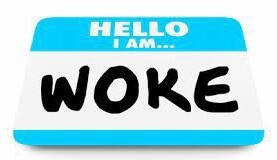
Who knew the word “woke” would evolve beyond a verb used to describe something all people do when we arise from bed in the morning or from a cat nap. Now, being woke describes people who are keenly aware of the occurrence of racism and social injustice. That’s cool. I smile and SMH. Then I realized, “Wait! I’m woke too.” Scope this.
I am woke to the reality that the COVID-19 pandemic has divulged a lack of true leadership in America.
I am woke to the reality that parents must play an integral role in their child’s education, no matter the teaching format.
I am woke to the reality that conservative and liberal politicians are one in the same.
I am woke to the reality that no life is more valuable than another.
I am woke to the reality that there are people who profit from inciting division.
I am woke to the reality that pain, suffering and oppression impacts all people.
I am woke to the reality that service to others requires sacrifice.
I am woke to the reality that there are no insurmountable obstacles.
If you can get with that, now you woke.
[image error]February 3, 2021
An enduring legacy for America
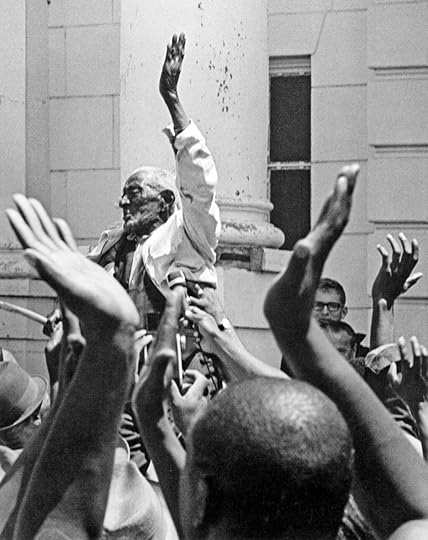 106 year-old former slave, El Fondren being celebrated as he registers to vote for the first time in Batesville, Mississippi, 1966. Photo courtesy of Bob Fitch.
106 year-old former slave, El Fondren being celebrated as he registers to vote for the first time in Batesville, Mississippi, 1966. Photo courtesy of Bob Fitch.— As a little boy I was told a story about a black man who toiled without worry.
— He loved his family. He loved God.
— His faith and commitment never wavered. His life and his struggles were not a façade.
— When push came to shove, he shoved back. Each & everyday he was reminded by the authorities who took an oath to serve him, “Boy get back.”
— He knew who he was and knew where he was going, and it was not in the direction the wind was blowing.
— He sowed good seed and produced fruit after its own kind. Thank God for him I am a man with my own mind.
— His children’s children are preachers, teachers, lawyers, scholars, and men and women of honor. The enemy failed to see he was more than a conqueror.
— His journey truly began in 1966 at the age of 106. With vigor and determination, Great, great Uncle El Fondren, born into slavery, set a chain of events into motion.
— You walked into the Panola County, Mississippi voting office to register to vote, after years and years of being denied. You stood tall, with your head held high, captivated a nation by restoring a people’s civic pride.
— Your life and the lives of others mattered, and you acted. It was your time then. A crisis awaits us. It is our time.
— Stand up, walk up & sign up to vote. We have the power to make changes for ones self and each other.
— Thank you Uncle El for not submitting to hopelessness and despair. No one would have blamed you if you gave in and threw your hands up in the air.
— Yet, you uttered a simple prayer, stepped forward and did not accept being told, “No!”
— Thank you Uncle. I know what I must do.
The knowledge of history is critical to understanding the world. The knowledge of history should foster hope and encourage us to transcend life’s challenges. The knowledge of history, if internalized, can often propel an ordinary person to take action that has the potential to alter the future of the world. The knowledge of history can restore a person and bring reconciliation to a nation. History that is presented out of context or inaccurate is a disservice to everyone. Most importantly, a knowledge of history can inspire and equip every boy and girl to dream. That is what Uncle El’s life did for me and for everyone you knows what he endured to register to vote.
El Fondren’s heroism transcends what is traditionally known as “Black History Month.” Uncle El will never be defined by his age, race or the circumstances of time. His actions on that day will not be limited to a moment in black history. The actions he took that day were the actions of an American who would not be denied his inalienable right. It is an enduring legacy for every American. I am proud to carry it forward and pass it on to others. You should also. It is your history.
[image error]November 21, 2020
A Father’s gift . . . .
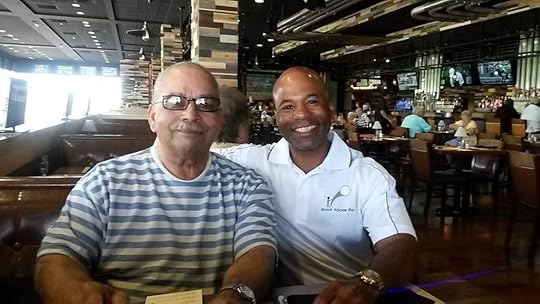 Girard Murphy (L) and Elvage Murphy (R)A Father’s gift . . . .
Girard Murphy (L) and Elvage Murphy (R)A Father’s gift . . . .I recall a time when fathers were highly regarded and respected. I was immersed in a family and a community where kids had a father in the home. Generally, most of these men held places of honor in their churches, neighborhoods and homes. I remember when I, one of my cousins, or friends spent the night at each other’s homes, it was understood that you did not test the patience, presence or authority of the man of the house.
My father raised me and my brother. He teased, taught, nurtured, mentored, molded and shaped us. He did not have the template of a father growing up. Nevertheless, he learned to be one. He is an imperfect, strong-willed man who always provided for his family. He was born in 1940. Dad is a product of what we know to be the Silent Generation (1928–1945) and Baby Boomers (1946–1964). He has experienced and endured the hardships of Jim Crow. He is a veteran of the United States Marines. He has navigated the gauntlets of marriage, parenting, divorce, remarriage and being a widower.
As he nears his 80th birthday, Dad is experiencing the onset of advanced aging. However, he has not lost his vigor. He remains an intimidating presence. He abhors nonsense and has no patience for people who make excuses. He is a principled person who remains resolute about his stances politically. He believes there is no substitute for hard work, and being just toward others. He lives by his convictions which places him at odds with people he knows well. When differences with others become irreconcilable, he is not afraid to acknowledge it as untenable. He “speaks his peace”, and moves on. Dad is a man who learns from his circumstances. He endures what life throws at him. Even when my brother and I disagree with our father’s decisions, we never have reason to question his motives to do what is right and honorable.
Dad has a side to his personality that is rarely seen. He loves unconditionally. He has become increasingly generous with his time, wisdom and finances. My brother and I have witnessed this growth, and his openness to let go of the offenses others have committed against him. He demonstrates a willingness to forgive and remains receptive to the prospect of reconciliation. Our knowledge of his personal struggles, conflicts and goodness has prepared us to be men who can successfully navigate life’s challenges. According to him, “You have to learn how to roll with the punches.”
In his article, “Mama’s Boy: There are some things you just can’t teach your son”, Jazz Keys wrote:
[T]he unavailability of a father also means that young Black men move about in this world without knowing how to express their rage and pain constructively, how to command respect with their presence, or how to stand firmly against oppression and racism. Our father taught us becoming a man is a process. You will fall short on your journey. You may hurt those you love. You will learn to persevere, apologize, forgive and reconcile.
Dad constantly challenged me and my brother to be good students and better citizens. The people he admires include Martin Luther King, Jr., Presidents John F. Kennedy and Barack Obama, Muhammad Ali, Jim Brown, and Congressman John Lewis. Once, he issued a challenge by reminding me of the difference between my and Martin Luther King, Jr.’s capacity to love and forgive others unconditionally who wronged him. I told him “I don’t know if I can forgive all that . . . .” He quickly interrupted and said, “That’s the difference between him and you.”
My brother and I speak frequently. We discovered we are routinely asked why we don’t get angry about the racial injustices we see or experience. People assume we are not bothered by it or are somehow immune. To the contrary, we experience hurt, anger and frustration. We learned from our father not to allow our emotions to dictate how we respond or make decisions. We learn to listen twice as much as we speak. Through our father’s example we learned to strategically measure our responses to unpleasant situations. He would say, “If you have nothing to say, say nothing at all.” Don’t be afraid to be silent, listen and objectively reflect on the circumstances of a situation. Dad taught and showed us the importance of relying on our intellect, not our emotions, and certainly not violence, when faced with conflict or tumultuous moments. He was hard on us and only let up when he saw in us what he expected. It is from him we derive our manhood.
Dad taught us being a man is never about how much money you make, the style of clothes you wear, the car you drive or the house you own. Being a man is about putting the needs of others before yourself. Being a man is about making and keeping your commitments and not making excuses. Being a man requires self-reflection and an evaluation of oneself. Being a man is about fostering and investing in the dreams and visions of your loved ones. Finally, being a man is also about “working” to love those who hate you.
Dad has never been a big talker. He does not boast or brag about his accomplishments. He has always been and remains a man of action. He does not expect or wait for someone to do something for him. Although I wish he did, he rarely asks for help. It is not the way he is wired. Yet, he is ready, willing and able to help others. He has a brilliance and intelligence I have always admired. He has the uncanny ability to teach himself and learn skills that leave people in awe of his work-product.
Our father set and lived by a standard we were expected to follow. His life resembles an imperfect man’s pursuit of perfection. He expected a lot of him self. Thus, he could be critical of the people around him. We came to realize his critique of us was his way to make sure we remained grounded and humble. Even today it is a tough standard to live up to-a heavy burden to carry. Yet, it was Dad’s standards and view of the world that equipped me and my brother Terrance to navigate uncertain times, discern truth and take difficult and unpopular positions in our respective lives. We are not deterred by what we see and what we hear. We are not bound by fear. We have the dignity, strength and conviction gifted to us by our father. It is the gift we remain committed to pass on to our progeny.
Following the 2016 Presidential election, my daughter expressed concern and anxiety related to the outcome. The gist of my response was:
The outcome of this or any election does not change your life’s purpose. Focus on doing what you can do to positively impact the world within your sphere of influence. You cannot control how others will behave. However, you can control how you respond to it.
As dad would say ,“You’ve got to learn to roll with the punches.” It would shock some people to know our father bestowed a gift to us in the form of tough discipline, harsh and blunt words, and sarcasm that may appear cold and lack empathy. It did. However, a deeper look reveals it was all by design to prepare his sons to face what life would throw at us. In short, our father’s gift appears to be the gift that keeps on giving.
Happy 80th birthday Dad
[image error]October 3, 2020
“An Appointed Time”

L.W. was a mother of three children, a full-time student and an emergency medical service worker. She was a hard worker. Her work product was exceptional. I recall saying to myself, “She is destined to have a successful career.” Outside of exchanging a few pleasantries before and after class, our interactions were primarily relegated to the classroom. Inevitably, L.W. graduated with a Bachelor’s Degree in Criminal Justice and a Minor in Political Science. She successfully transitioned to work for an Emergency Medical Services software company.
Recently, while purging some old files I discovered copies of emails, letters, and cards from former students. Admittedly, some I did not take the time to read. I stored them away thinking, “I’ll read them later when I have time.” The time finally arrived. As I started to read these emails, letters and cards, the content and tone of these messages, composed 15 to 20 years earlier, unleashed emotions I rarely experience. Yet, it was the email I received from L.W. in 2008 that captivated my attention. On Friday, April 6, 2008, L.W. wrote:
Professor Murphy:
I just wanted to take a few minutes to say thank you for the encouragement, advice, and support. . . . My dreams are finally within my reach, and with every new excitement, comes new fear[s]. Encouragement from those I respect renews my strength, and enables me to continue to put one foot in front of the other. . . . I applaud your efforts to instill in each of us the importance of looking deeper within ourselves.
If you will indulge me, I would like [to] tell you what a remarkable professor you are . . . [to me]. I watch you interact with students in the hallways, who frequently make mention of how wonderful you are [to them]. . . . I’ve taken three or four of your classes, and day after day I watch you engage a room full of students. . . . You are always prepared for class in spite of the fact that you have more than one time consuming career. All of these things are impressive. . . . [W]hat won you my utmost respect from the very beginning is the love and respect you have for your wife and your family. You mention them often in class, and whether or not you realize it, it makes a big statement. You have the admiration of your students and your peers, but in my estimation what makes you a true professional is that you openly show the same care and commitment to your family as you do to your career. That is the epitome of greatness. . . .
Respectfully, L.M.W.
Life has taught me there is an appointed time, a season for everything. Whether you believe in God and trust in His timing, none of us is capable of escaping or running away from the people and the lessons life has in store for us. Rarely are these teachable moments documented or recorded. L.W.’s words are a reminder that my interactions with all people have value, and the potential to inspire life-defining moments in others.
As divisiveness permeates the world, and seeks to destroy and take away my peace, I know I can find a quiet place to reflect on the people whose lives I have been able to positively impact with my words, example and character. L.W., albeit 12 years later, your words have renewed, inspired and motivated me to continue to do good work. I could not have read your words at a more appropriate or . . . appointed time. Thank you.
[image error]September 7, 2020
Our use of the “N” word feeds the disrespect we experience.
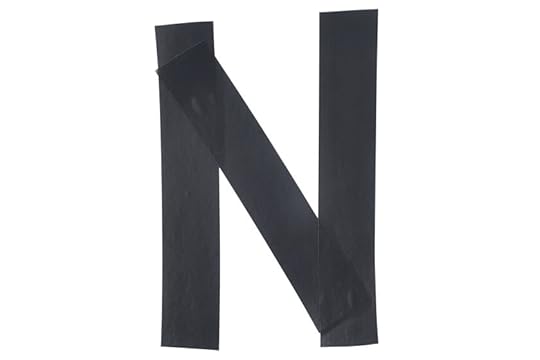
Our use of the “N” word feeds the disrespect we experience.
The tragic deaths of George Floyd, Breonna Taylor, and Ahmad Arbery are not in vain. The circumstances of their respective deaths set off an awakening throughout America. The voices of a mixed demographic of Americans have called for social justice, which includes an end to police brutality, and the removal of statues and monuments honoring the legacy of the old Confederacy. NASCAR has permanently removed the emblem of the old Confederacy from its sponsored events. Corporate America is boasting about their commitments to diversity. In response to the threats of boycotts, and the loss of sponsors, the professional football team in Washington officially announced it is retiring its current team name and logo that has been an affront to Native Americans. The team name and logo has represented the franchise for over 90 years. This awakening has become the beginning of the end of long-standing traditions that have racist and insensitive origins.
The imagery of “Black Lives Matter” is showcased on 16th Street in Washington, D.C., 5th Avenue, Manhattan, New York, Charlotte, North Carolina Montgomery, Alabama, Seattle, Washington, Pittsburgh, Pennsylvania, Topeka, Kansas, and Dallas, Texas.
My white neighbors, friends and colleagues have been inquiring about my family’s welfare and seek my views on the events that have been the genesis of this awakening. I have no doubt many of the inquiries have been sincere. Many are publicly acknowledging the truth of the circumstances facing black people in this country. In short, there are white people who want to do something to eradicate institutional racism from our country’s landscape. Are people of color gaining allies? Possibly. Nevertheless, America’s racist hypocrisy is at a crossroads. Now it’s our turn.
Now is the time for black people to abandon what has been accepted as a term of endearment that epitomizes self-hate and marginalizes our people’s existence. I call upon all black people to abandon the use of the term “nigger”, “nigga”, and any other variations. It is a callous term. I do not buy the argument or accept the conclusion that linguistic re-appropriation or reclamation of the term “nigger” is sufficient to resist oppression or is a viable mechanism by which we derive power through self-labeling.[1] “Nigger” is not just a word. Its origins are despicable. It was employed to oppress, subjugate, control and condition the minds and spirits of a great people. It was never meant for good. I will never use it to address my black brothers or sisters. Re-appropriation or reclamation has become a convenient excuse to create a gateway to acceptance and legitimization of a word that still taunts older generations of black Americans. I have seen with my own eyes older and treasured generations shed tears at the mention of that word. It still incites anger, fear and recollections of trauma experienced throughout their lives. Generations of black Americans were denied the privilege of being called by their first name, middle name and surname, preceded by Miss, Mrs. or Mr.. “Nigger” was often the substituted first name of black men in America. “Boy” was their middle name and “George” was their last name. I cannot fathom why beautiful people with an amazing culture, history and legacy of survival and prosperity would choose to embrace the idea that “Nigger” can ever be an acceptable way for a black man or woman to refer to one another or themselves. “My nigga” does not cultivate a love of self. It must not remain a part of our everyday language. If it does we share in the responsibility for the creation of an atmosphere that invites people outside of our communities to use “Nigger” in daily discourse freely and in a context our people do not intend.
[1] https://thedailyaztec.com/91951/opinion/reclaiming-slurs-is-a-form-of-resisting-oppression/
[image error]August 19, 2020
Who are “We the People?”
Who are “We the People?”
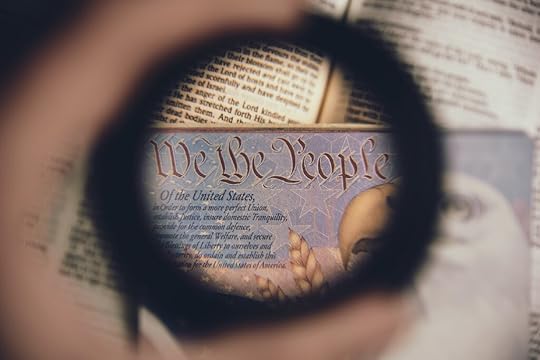
The only way you can effectively test or measure a nation’s moral compass is through an evaluation of its people. Every person does not hold to the same values, belief system, political ideology, and experiences. There is no denying that throughout our nation’s history, we have been confronted with innumerable differences, strife, protests, and injustices. The language of the 2016 presidential campaign helped sow the seeds of discord and division and elevated it. The rhetoric exhibited by the presidential candidates from the 2016 campaign was a spectacle-featuring landmine-like commentary, and name calling unlike any campaign many have witnessed in their lifetimes. As a result, “We the People”, are now hard-pressed to achieve some semblance of reconciliation. What it will take is a truthful and candid admission that we do not like who we have become and how far we have deviated from the values, vision and mission that was designed to distinguish us from every other country in the world. I remember my father telling me over and over again, “America is not perfect. There are a lot of problems in this country. However, this is the greatest country in the world.”
Today we view and limit our understanding of the value of our country through the rose colored lenses of patriotism and those we elect. This less than stellar representation should never be the reflection of our nation’s identity and values. It is unfortunate that elected officials who seek public office in the United States are generally viewed as being more concerned about undermining the effectiveness of their opposition, protecting their turf, and gaining tactical advantages and leverage to serve their own interests.
A career in politics is not for the faint of heart. It is not a livelihood or professional area of life which engenders respect or appreciation from the general public. Americans have become indifferent to the current political landscape and the representations of those who run or serve in public office. In the 2016 presidential election, an estimated 58% of eligible voters participated, in comparison to 60% in 2012. In both election cycles, less than two-thirds of eligible voters voted for the highest office in the land. What may discourage American citizens from participating in a process which by design epitomizes the mandate of our Preamble, are numerous and debatable. However, is not difficult to discern that Americans are disheartened and believe that public officials pursue their own interests at the expense of the public they take an oath to serve. This belief is widespread among the general public. In a 2014 Gallup News poll, 75% of Americans polled perceived corruption is widespread throughout the United States government.[1] In 2017, it was 67% of Americans.[2] In a national survey conducted by Rasmussen Reports, 81% believed the federal government is corrupt.[3] The perception among Americans is our elected officials lack integrity. Elected officials do not have the trust of its citizens. When trust is compromised, it is very difficult, if not impossible to regain it. A loss of trust in one’s government causes citizens of a country to shut down, protect and hide one’s vulnerabilities.[4] We become fearful, and resist being accountable to our neighbors, and our country. It is clear the loss of trust has discouraged and turned us away from aspects of life we once respected and honored.
“We the People. . .” have become disinterested and indifferent to the active roles we are designed to play in our nation’s system of governance. Our fixation is too often on the reported turmoil, angst and conflict. We feed the turmoil by watching, arguing and debating points of contention with our neighbors, family and friends about who is right and who is wrong. If we allow a “discussion” about political parties and candidates to permeate our fears, angsts and anxieties, divisiveness reigns. The Preamble is a very short and simple to understand. However, it offers our nation a guiding light into of who and what our nation is purposed to become, without exception. Our individual and collective framework for decision-making must be driven by the logic, reason, compassion and mercy necessary to achieve its mandate. If we continue to measure ourselves by those who dishonor the words of the Preamble, we will continue to see it as a laudable, yet unattainable.
When “We the people”, are entrusted with the responsibility of exhibiting leadership, refuse to boldly address or condemn divisiveness, we embolden those who commit them. Subsequently, our ability to see and analyze issues objectively and thoroughly is compromised by the onslaught of unrestrained anger, and rage we see depicted through the media, and in our communities. Our emotions are inextricably linked to our politics, and faith based beliefs, and when left unregulated, tends to incite misunderstandings, and prejudices, which leads to outcomes and conclusions that are contrary to the truth, and justice.
[1] Gallup News, September 19, 2015
[2] Gallup News, September 19, 2015
[3] Rasmussen Reports, February 3, 2016
[4] Kashtan, Miki, Some thoughts about trust. Pyschology Today, 8/31/12
[image error]


